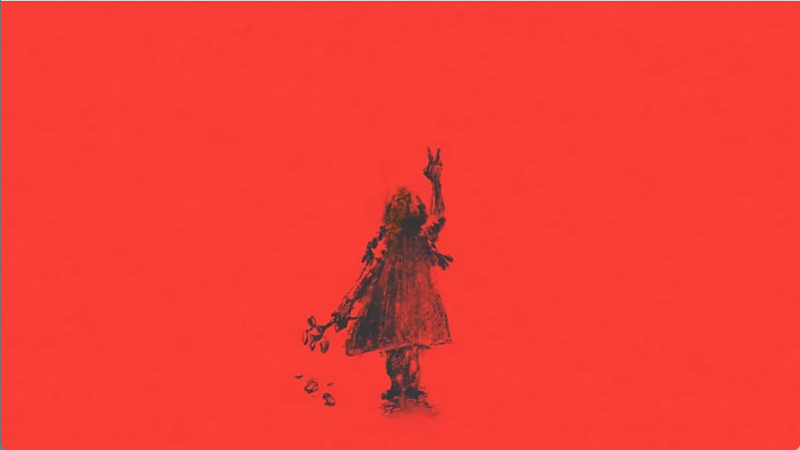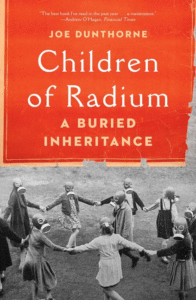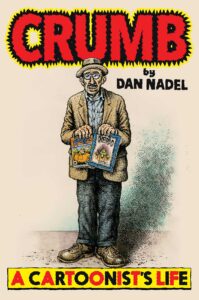
Our smorgasbord of sumptuous reviews this week includes Justin Taylor on Katie Kitamura’s Audition, Francine Prose on Joe Dunthorne’s Children of Radium, Elamin Abdelmahmoud on Omar El-Akkad’s One Day, Everyone Will Have Always Been Against This, James Wood on Eva Menasse’s Darkenbloom, and Marc Weingarten on Dan Nadel’s Crumb: A Cartoonist’s Life.
“Katie Kitamura has a well-earned reputation as a writer of rare precision and quiet intensity. Words like lucid, cool, muted, dry, astringent, sparse and spare all regularly feature in criticism (much of it rapturous) of her two most recent novels, both narrated by unnamed women living liminal lives in purgatorial places.
…
“Tonally and in certain surface ways, Kitamura’s new novel, Audition, is of a piece with her previous works. But the questions it provokes and the form it takes are both stark departures, which makes for a bracing, unlikely, almost auto-deconstructive conclusion to this loose trilogy of taut novels. This unnamed narrator is an actor, someone for whom performance involves interpretation but isn’t solely defined by it. Rather, her work forces her to be first and foremost a physical presence, a body on display in space, and therefore ineluctably defined by race, gender, age and attractiveness even as she works to disappear into a given role.
…
“The first time I read Audition, I found it a deftly crafted, slow-burn psychological thriller full of sly metafictional reflections on the nature of storytelling and identity, on just how much rehearsal, interpretation and collaboration it takes to produce these performances we so blithely call our lives. Those judgments held the second time I read it, but what also stood out then was how the marital disturbances triggered by Xavier’s (re)appearance—alternating currents of trust and suspicion, the sick-making seesaw of ‘an imbalance of want’—develop with near perfect continuity from Part One to Part Two, even as Kitamura turns their instigating circumstance inside-out.”
–Justin Taylor on Katie Kitamura’s Audition (The Washington Post)

“It must be hard to find the appropriate tone in which to tell a family horror story that goes back generations—a problem compounded when an ancestor was not the innocent victim of that horror but one of its perpetrators, or at least a willfully obtuse collaborator. One doesn’t want to sound reflexively judgmental or apologetic, secretly proud of one’s criminal DNA, or resentful of the burden levied by the sins of the dead. It must be even more complex when the consequences of the crime are enormous, when the skeletons in the closet are, by any standard, numerous.
…
“Among the unusual and surprising things about Children of Radiumis that this grim summary doesn’t remotely convey the experience of reading the book. Dunthorne, a British novelist and poet, has found a tone that is at once predictably appalled and unpredictably amusing, wry, and self-mocking. His animated narrative voice is often funny without ever seeming facile or irreverent, and without trivializing—or losing sight of—the gravity of his subject.
…
“Beneath the book’s lively surface are a number of complex and serious themes: courage, self-delusion, conscience, the unreliability of memory, and the folly of believing romantic family stories about the past. Dunthorne avoids a sustained consideration of hereditary guilt and the ongoing debate about whether the descendants of slaveholders or of perpetrators of genocide or of the manufacturers of poison gas can be held accountable for the misdeeds of their ancestors.”
–Francine Prose on Joe Dunthorne’s Children of Radium (The New York Review of Books)
“In fiction, El Akkad is posing consistent questions: What would it take to render a horror ‘over there’ equally real to one ‘over here?’ How do we lie to ourselves so convincingly, and what is the cost of those lies?
These questions burn and throb with a haunting clarity in El Akkad’s first work of nonfiction, One Day, Everyone Will Have Always Been Against This. It is a muscular broadside against the Western machinery, both narrative and literal, that keeps the killing of innocent Palestinians seen as a distant, clinical news story instead of an intolerable and unending cascade of death. ‘It may seem now like it’s someone else’s children,’ El Akkad writes, ‘but there’s no such thing as someone else’s children.’
…
“It would be more accurate to say that One Day is something of an archaeological dig. El Akkad is trying to unearth a truth: that beneath the seductive mirage of the West’s ‘rules-based order’—that collection of assertions, images, stories, moralities and wars—lies a ‘completely malleable thing whose primary use is not the opposition of evil or administration of justice, but the preservation of existing power.’
…
“But if this firm rejection of trying to talk to ‘both sides’ has the effect of limiting who the book speaks to, it may also stiffen the resolve of readers who come to it craving moral clarity. It reminds me of a story I heard once, about the late Toronto filmmaker Charles Officer, who was asked why he makes films that preach to the choir. It is because the choir must be fortified, he answered. El Akkad is tending to an exhausted choir, so that its song may ring clear.”
–Elamin Abdelmahmoud on Omar El-Akkad’s One Day, Everyone Will Have Always Been Against This (The Washington Post)

“We know this kind of novel. Reliable as the seasons, its opening pages disclose a familiar reality. A hovering, Godlike narrator looks down upon a European border town and begins to describe it. Since the novel is long—more than four hundred and fifty pages—and its title is also the town’s name, we anticipate a small world that will prove intricately large and tangled. The prose must first uncover the immovable furniture, then introduce the immovable inhabitants. This ancient place, doldrummed in an eastern corner of Austria, has a mostly ruined castle, a central hotel (the Tüffer), a couple of supermarkets, and a train station that, three times in the past century, has been demolished and rebuilt—each time worse. Like many European towns, it has a mazy old quarter, with cobbled alleys and crowded streets, beside an uglier new section. The inhabitants include a grocer, a travel agent, a general practitioner, a mayor. Then, in August, 1989, two mysterious men arrive. The clock of plot begins to tick. But Darkenbloom, a new novel by the Austrian writer Eva Menasse—her second, after Vienna, published two decades ago—is stranger than this suggests.
…
But it is Menasse’s style—which is to say, the way she uses her narrator—that makes the case for her deep and original reimagining of history. This teasing, searching, playful, scathing voice, half inside the community and half outside it, sometimes as bland as soup and other times as sharp as death, recounts history as no responsible historian could. The novel’s scornful power is bound up with the way it enacts and embodies its curious push-pull of identification and recoil, affiliation and disgust. Yet this doesn’t quite capture the book’s elusive tone, since the narrator’s identification with Darkenbloom is so highly ironized, while her recoil from Darkenbloom is at the same time so knowing, almost world-weary. Her novel may be set in 1989, but it’s very much a text of the twenty-first century, a document of cynical hindsight. This cynicism, though bleakly unsparing, saves the work from sentimentality or the unearned melodrama of inherited Holocaust legend. Instead, one has the sense of a kind of irritated prosaicism on behalf of the author, as if Menasse, in a distinguished Austrian tradition, were angrily quarrelling with her own countryfolk. As a result, despite its heavy history, Darkenbloom doesn’t read like some overdetermined historical ‘Nazi novel’; it reads like a satirical, intemperate, gossipy small-town novel, into which Nazi history just happens to have dropped.”
–James Wood on Eva Menasse’s Darkenbloom (The New Yorker)

“Robert Crumb is to comics what Louis Armsrong is to jazz, a revolutionary who pulled a maligned and misunderstood art form out of the shadows. In the forward to his new biography, Crumb: A Cartoonist’s Life, Dan Nadel provides some context: ‘There is no Maus, no Persepolis, no Fun Home, without [Crumb’s] taboo–breaking … formally inventive work.’ Nadel’s gripping and essential book makes good on this claim; his biography is the story of how one highly flawed and preternaturally gifted man augured a revolution in comic book storytelling with his discomfiting, sexually frank, intensely personal oeuvre.
…
“Crumb in 1966 would create his familiar gallery of comic book avatars—Eggs Ackley, Flakey Foont, and Mr. Natural, his first Keep on Truckin’ high-stepper. The comics were brazenly perverse and sharply satirical, stories of sexual fetishism and urban depravity next to gently savage attacks on religion and the nuclear family. The die was cast: Crumb was an outsider raging against the mindless conformity of postwar America, Salinger with a Rapidograph pencil. Nadel pegs this as the moment when Crumb’s id took charge, ushering in a new era of highly idiosyncratic personal and social exploration in comic art.
…
“Crumb is a complex guy, in short, and Nadel understands that genius and virtue are often incompatible, especially with an individual as tortured as his subject. There is a lot of ugliness from Crumb here, including parental neglect and serial philandering, but there is also his abiding love and deep respect for his second wife, comic book artist Aline Kominsky, which held for nearly 50 years until her death in 2022. Nadel tells their story movingly, with empathy and affection.”
–Marc Weingarten on Dan Nadel’s Crumb: A Cartoonist’s Life (The Boston Globe)

